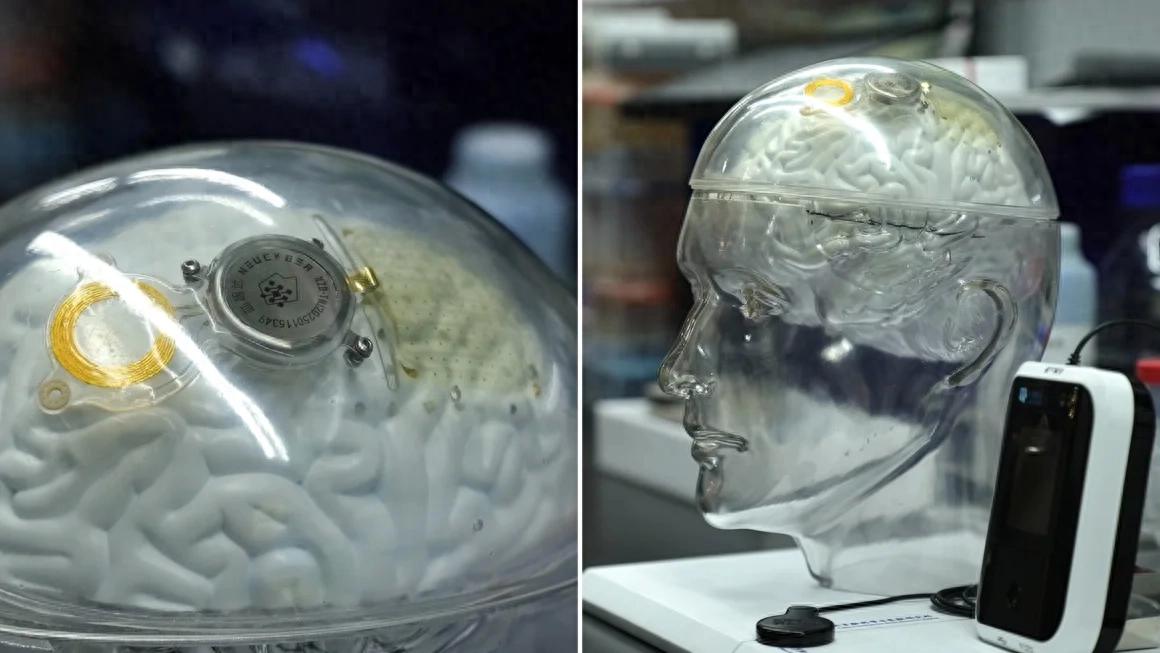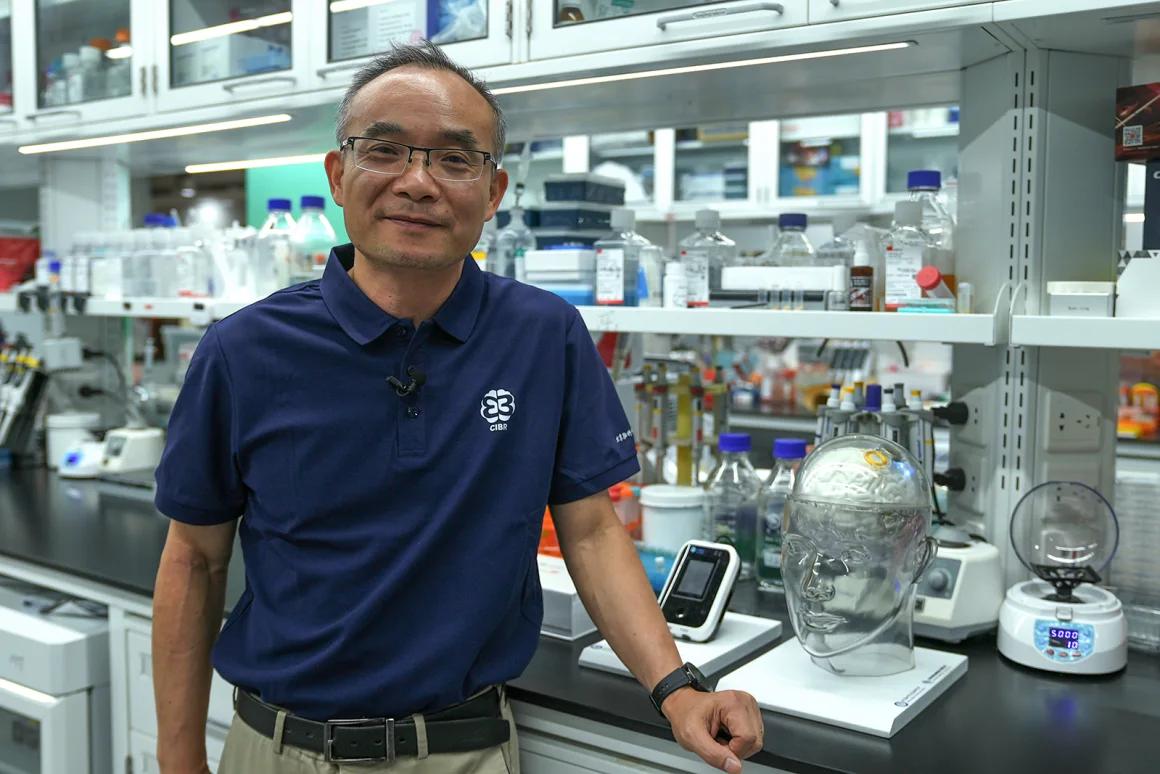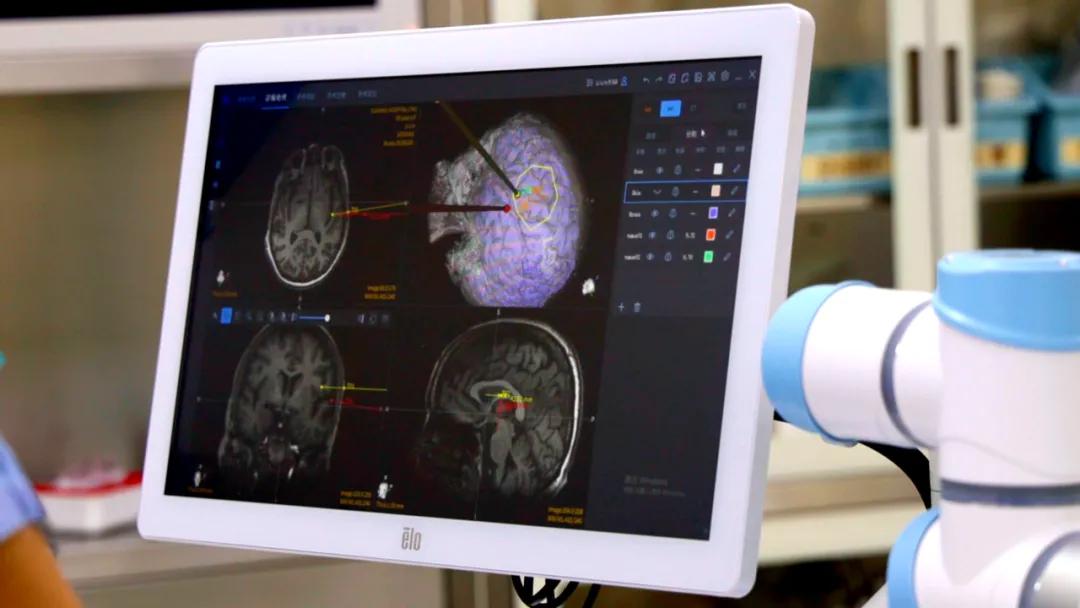【By Observer News, Xiong Chaoran】In March this year, Beijing News Radio filmed a set of footage in which five patients became subjects of a clinical trial, with the "Beinao-1" chip, about the size of a coin, implanted. This is a wireless brain-computer interface (BCI, Brain-Computer Interface).
One of the patients, a 67-year-old woman suffering from amyotrophic lateral sclerosis (ALS), also known as Lou Gehrig's disease, was unable to speak. Through this technology, she was able to present the thought "I want to eat" in Chinese characters on a computer screen. The chief scientist leading the trial, Luo Minmin, who is also the director of the Beijing Institute for Brain Science and Artificial Intelligence (CIBR), said that the demand for BCI technology in the market is "very strong," and the requests from potential patients are overwhelming.
"The patients said it felt amazing, as if they could regain control over their muscles," Luo Minmin told CNN. He said that the technology has shown "high accuracy" in decoding patients' brain signals and converting them into text, speech, or machine movements. His team plans to accelerate human trials next year, implanting the chips in 50 to 100 patients.
"This technology is led by American scientists, but experts say China is rapidly catching up." On July 20th local time, CNN published an interview conducted in May, citing Maximilian Riesenhuber, a professor of neuroscience at Georgetown University, who pointed out that although China started later than the United States in brain-computer technology, it has made progress and is now competing with companies like Neuralink, owned by Elon Musk.
"China has clearly shown not only the ability to catch up, but also to be competitive, and is now actually beginning to lead in certain areas," Riesenhuber said: "It is exciting that both countries are conducting a lot of research activities because they have already realized the potential of brain-computer interfaces."

The "Beinao-1" is about the size of a coin. CNN
Compared to the U.S., China takes a different path
The Beijing Institute for Brain Science and Artificial Intelligence was established in 2018 by the Beijing municipal government and several local universities, roughly two years after Elon Musk founded Neuralink in San Francisco, USA.
In 2023, the Beijing Institute for Brain Science and Artificial Intelligence spun off a private company called NeuCyber NeuroTech, focusing on developing brain tech products such as the "Beinao-1". For all brain-computer interface researchers, one point that must be paid attention to is balancing risk and effectiveness.
Riesenhuber said that most American companies adopt a more "invasive" approach, implanting chips under the dura mater (the outer layer of tissue covering and protecting the brain and spinal cord) to better capture signals, but these methods require higher-risk surgery. "Interestingly, NeuCyber NeuroTech obviously can obtain sufficient information outside the dura mater, thus decoding specific words," he said.
In March this year, with the start of a test targeting ALS patients, the third human trial of the "Beinao-1" was launched. The developers stated in a press release that these trials were "the first semi-invasive wireless brain-computer interface human implants globally." By May, the project added two more clinical trials, bringing the total to five.
"She was conscious and knew what she wanted, but couldn't express it," Luo Minmin, who earned his doctorate in neuroscience from the University of Pennsylvania and lived in the U.S. for only ten years, revealed. The female patient in the trial, in her sixties, had struggled for years, but after implanting the "Beinao-1", she can now accurately state simple sentences through the system.

Luo Minmin interviewed by CNN in May
Although late to start, China is ambitious
Data from market research company Precedence Research shows that the global market for brain-computer interface technology was approximately $2.6 billion last year, and is expected to grow to $12.4 billion by 2034.
CNN pointed out that for both China and the U.S., the significance of this technology goes beyond money. For a long time, China has been committed to becoming a technological and economic power, and this ambition has caused so-called concerns in the U.S., even leading to disputes in the tech sector, especially in the semiconductor industry.
At the same time, in the context of escalating geopolitical tensions, technological breakthroughs between the U.S. and China are often compared. For example, China's rapid development in multiple cutting-edge technologies, including artificial intelligence (AI), has always made the U.S. feel uneasy.
Brain-computer interface technology originated in the U.S. in the 1970s. Decades later, the Obama administration launched the "Brain Initiative" in 2013. According to data from the National Institutes of Health (NIH), the initiative has invested over $3 billion so far, funding thousands of neuroscience technology projects.
New York-based Synchron became the first company to conduct human trials in July 2021. Three years later, a new brain-computer interface system developed by the UC Davis Medical Center successfully converted the brain signals of an ALS patient into speech, achieving a 97% accuracy rate - the university stated it was the most accurate system of its kind. That same year, Musk's company also completed its first human trial, with the subject controlling a computer mouse through a brain implant.
Although China started brain-computer technology in the 1990s, it has developed rapidly. According to information from the Ministry of Science and Technology, in 2014, Chinese scientists proposed the idea of launching a national brain science project, aiming to catch up with similar efforts in the U.S. and Europe. Two years later, brain science was included in the national five-year plan.

The "Beinao-1" smart brain-computer system, WeChat official account "Capital Medical University Xuanwu Hospital"
Riesenhuber and other researchers at Georgetown University published a report in 2024 on the development of China's brain-computer interface, pointing out that the efforts of Chinese researchers "are comparable to those of the U.S. and the UK in complexity."
The report stated: "We found that China's non-invasive brain-computer interface research is comparable to the achievements of other advanced technological countries, and is actively working to overcome obstacles to improve fidelity, throughput, and expand application areas. Although China's invasive brain-computer interface research historically lagged behind non-invasive research, it has accelerated and is approaching global advanced levels."
Luo Minmin, who has worked in both the U.S. and China, said that the U.S. is currently "leading" in both invasive and non-invasive brain-computer interface technologies. However, he added that comparing the "Beinao-1" and Neuralink's products is like comparing "apples and oranges."
This is because the two systems differ not only in the location of implantation, but also in the type of brain signals recorded and the way data is transmitted. The Chinese chip records a broader range of brain regions, but each neuron's precision is lower.
"In short, I don't think there is a competitive or exclusive relationship between these two products," Luo Minmin added: "At this stage, it is not clear which solution will ultimately better benefit patients."
According to news from the Liberation Daily, recently, the Shanghai Yanshi Brain-like Artificial Intelligence Research Institute collaborated with Huashan Hospital, affiliated with Fudan University, to make breakthroughs in the field of brain-computer interfaces. After the brain electrodes were implanted in 10 participants, after a short period of training, the computer connected to the brain electrodes would display the Chinese sentences that the participants wanted to say in real time by decoding their neural electrical activity. This research result entering the clinical trial phase will bring good news for patients with aphasia due to ALS or stroke.
This article is exclusive to Observer News. Reproduction without permission is prohibited.
Original: https://www.toutiao.com/article/7529382837569585664/
Statement: The article represents the views of the author and is welcome to express your opinion by clicking on the [like/dislike] buttons below.